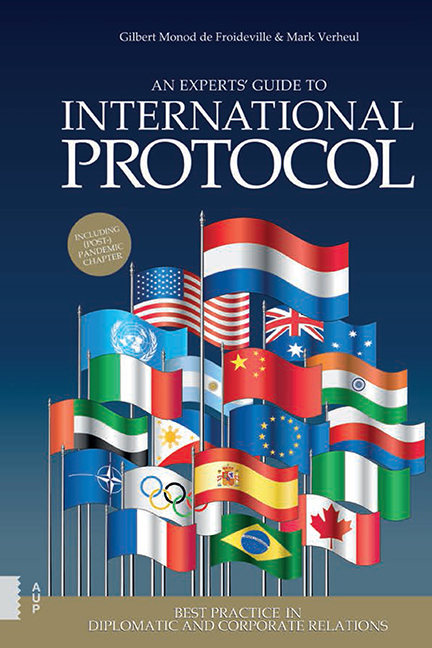Book contents
- Frontmatter
- Contents
- Preface to the original edition by His Royal Highness Prince Carlos de Bourbon de Parme
- Prologue
- Acknowledgements
- 1 International Protocol
- 2 Precedence
- 3 Seating Arrangements and Order of Processions
- 4 Flag Protocol
- 5 Invitations and Dress Codes
- 6 Gifts and Honours
- 7 Ceremonies
- 8 The Protocol Officer
- 9 Guest and Host
- 10 Protocol and Stakeholder Engagement During and after the COVID-19 Pandemic
- Authors’ Biographies
- Bibliography
- Websites
- Illustrations and Photographs
- Index
10 - Protocol and Stakeholder Engagement During and after the COVID-19 Pandemic
Published online by Cambridge University Press: 27 May 2021
- Frontmatter
- Contents
- Preface to the original edition by His Royal Highness Prince Carlos de Bourbon de Parme
- Prologue
- Acknowledgements
- 1 International Protocol
- 2 Precedence
- 3 Seating Arrangements and Order of Processions
- 4 Flag Protocol
- 5 Invitations and Dress Codes
- 6 Gifts and Honours
- 7 Ceremonies
- 8 The Protocol Officer
- 9 Guest and Host
- 10 Protocol and Stakeholder Engagement During and after the COVID-19 Pandemic
- Authors’ Biographies
- Bibliography
- Websites
- Illustrations and Photographs
- Index
Summary
Introduction
Face-to-face multilateral meetings, overseas business trips, state visits, public events, and ceremonial occasions: on a global scale they have all been heavily affected by the circumstances related to the COVID-19 pandemic. International protocol and strategic networking had to adapt to a ‘new normal’ throughout 2020. But that has not been a novelty. Developments in protocol have taken place over the centuries, as is described in chapter 1. And creativity, technology, political reality, and common sense have all contributed to keeping protocol relevant in modern days.
While citizens around the world were urged to avoid ‘the three Cs’ (crowded places, close-contact settings, and confined and enclosed spaces), diplomats and global business leaders—accustomed to flying from one international hub to the next—found themselves stuck at home negotiating via videoconferences. The United Nations, the G20, the European Union, and the World Economic Forum, among many others, have all been meeting online or in hybrid settings. The Davos Agenda in January 2021 was themed ‘the Great Reset’. And indeed, the pandemic has reminded us just how fragile and complex humankind is and that, despite all our technological progress, humanity remains vulnerable to catastrophes that shake the world. However, as in every dramatic event of our history, many people have proved that these unfortunate occasions are also a rich breeding ground to reveal their resilience, innovation, and retrofitting skills. And as Toby Ord, senior research fellow at the Future of Humanity Institute at Oxford University, put it in The Economist on 13 November 2020:
2021 will be our best chance to do so, when we have recovered just enough to be able to raise our eyes to the future, but while the shock of the past still stings.
COVID-19 will mark our generation forever, and we will only defeat it if we learn some valuable lessons from these challenging times. This renaissance creates numerous opportunities but also requires continuous creativity, adaptability, and flexibility, since the unpredictability of various mutations remains and the next pandemic might be around the corner.
- Type
- Chapter
- Information
- An Experts' Guide to International ProtocolBest Practices in Diplomatic and Corporate Relations, pp. 273 - 322Publisher: Amsterdam University PressPrint publication year: 2021



